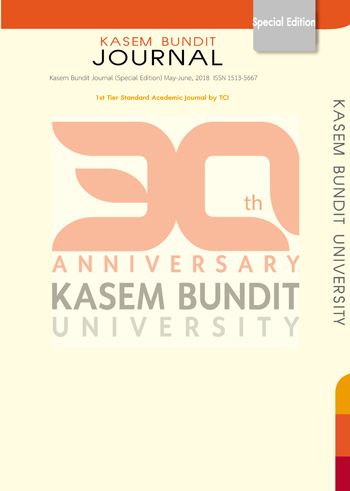Parental Understanding and Involvement on Students Learning Process: Dialogic Method in PLC Settings
Keywords:
dialogic teaching, dialogic method, plc, parental involvementAbstract
The aims of this study were to examine a process of gradual change in dialogue practices and promote parental understanding on students’ learning process at Vithidham School of Sakon Nakhon Rajabhat University. For this reason, we used dialogic method in professional learning community (PLC) settings as a harness of communication among the parents, to promote their involvement and enrich their understanding on students learning process. For this purpose, we collected observational data through reflective interviews and the video recordings of several dialogic activities in PLC settings. The participants of this study were school administrators, teachers, and parents. The results showed that the greater number of parents participating in PLC settings (using dialogic method), the higher probability they can involve and understand students learning process. Future research includes the concept of dialogic teaching among the school community (teachers, students, parents, etc.) so that everyone belongs and it can be incorporated into students learning into everyday teaching.
References
[2] Henderson, A. T., and Berla, N. (1994). A new generation of evidence: The family is critical to student achievement. Washington, DC: National Committee for Citizens in Education.
[3] Stewart, E. B. (2008). “School structural characteristics, student effort, peer associations, and parental involvement: The influence of school- and individual-level factors on academic achievement”. Education and Urban Society. 40(2): 179-204.
[4] Alexander, R. (2004). “Towards dialogic teaching: Rethinking classroom talk. Cambridge”. Dialogos.
[5] Bakhtin, M. (1981). The dialogic imagination. Austin: University of Texas Press.
[6] Alexander, R.J. (2008). Essays on Pedagogy. Routledge, especially pp 72-172 and 184-191.
[7] Alexander, R.J. (2010). “Speaking but not listening: accountable talk in an unaccountable context (2009 UKLA International Conference keynote address)”. Literacy. 44(3): 103-111.
[8] Barth, R. (1991). “Restructuring schools: Some questions for teachers and principals”. Phi Delta Kappan. 73(2): 123–128.
[9] Marzano, R. (2003). What works in schools: Translating research into action. Alexandria, VA: ASCD.
[10] Bryk A, Camburn E, Louis KS. (1999). “Professional community in Chicago elementary schools: Facilitating factors and organizational consequences”. Educ. Adm. Q. 35: 751-781.
Downloads
Published
How to Cite
Issue
Section
License
ทัศนคติ ความคิดเห็นใด ๆ ที่ปรากฏในวารสารเกษมบัณฑิตฉบับนี้เป็นของผู้เขียน โดยเฉพาะ มหาวิทยาลัยเกษมบัณฑิตและบรรณาธิการ ไม่จำเป็นต้องมีความเห็นพ้องด้วย







